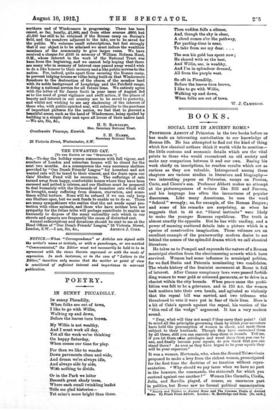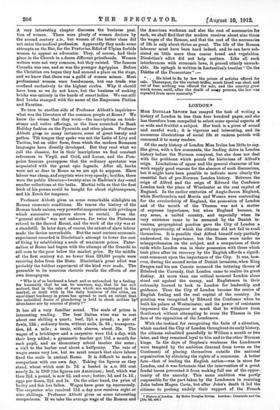BOOKS.
SOCIAL LIFE IN ANCIENT ROME.*
PROFESSOR ABBOTT of Princeton in the two books before us has made an interesting contribution to our knowledge of Roman life. He has attempted to find out the kind of thing which few classical authors think it worth while to mention— the little customs and economic details which are the vital points to those who would reconstruct an old society and make any comparison between it and our own. Basing his work chiefly on inscriptions, be reaches results which are as curious as they are valuable. Interspersed among these chapters are various studies in literature and biography— two interesting papers on Petronius, essays on Persius, Curio, and Cicero's son. Professor Abbott makes no attempt at the picturesqueness of writers like Dill and Ferrero, and his language has often the inexactness of popular discourses. Like many Americans, he uses the word "federal" wrongly ; as, for example, of the Roman Empire ; and some of his remarks are surprising, as when he suggests that in 44 B.c. "liberal instincts" were likely to make the younger Romans republican. The truth is almost exactly the opposite. But he has wide reading, and a power of massing scattered details into a picture which is a species of constructive imagination. These volumes are an excellent example of the praiseworthy modern desire to see behind the scenes of the splendid drama which we call classical literature.
He takes us to Pompeii and expounds the nature of a Roman municipal election from the electioneering scrawls which have
survived. Women had some influence in municipal politics, for we find Statia and Petronia nominating two candidates. The whole history of the feminist movement at Rome is full of interest. After Canna; sumptuary laws were passed forbid- ding women to wear gold or coloured garments, or to drive in a
chariot within the city bounds. When peace came the prohi- bition was felt to be a grievance, and in 195 s.c. the women
took matters into their own hands, and agitated so violently that the repeal bill was carried, and two tribunes who threatened to veto it were put in fear of their lives. Here is a bit of Cato's speech against the repeal, his version of the "thin end of the wedge" argument. It has a very modern sound.
" Pray, what will they not assail if they carry their point? Call to mind all the principles governing them by which your ancestors have held the presumption of women in check, and made them subject to their husbands. Though they have restrained them by all these, still you can scarcely keep them in bounds. Tell me, if you let them sties' e privileges and wrest them from you one by one, and finally become your equals, do you think that you can stand there? As soon as they have begun to be your equals they will be your superiors."
It was a woman, Hortensia, who, when the Second Triumvirate proposed to make a levy from the richest women, promulgated for the first time the doctrine of no taxation without repre- sentation. " Why should we pay taxes when we have no part in the honours, the commands, the statecraft for which you contend against one another ?" Women like Cornelia, Clodia, Julia, and Servilia played, of course, an enormous part in politics, but Rome saw no formal political emancipation • Society and Politics in Ancient Rome and Ths COM11110IL PsopI4 of Aseirag Soma. By Frank Frost Abbott. London : G. Boutledge and Sons. Us. each,] A very interesting chapter discusses the business posi- tion of women. There were plenty of women doctors by the second century A.D., but women of the better class did
not enter the medical profession. Apparently they made some attempts on the Bar, for the Prmtorian Edict of Ulpian forbids
women to appear as advocates. They, of course, had their place in the Church in a dozen different priesthoods. Women writers were not very common, but they existed. The famous Cornelia was one, and so was the younger Agrippina. Before the Christian era began they had secured a place on the stage, and we know that there was a guild of women mimes. Most
professional women were freedwomen, but one trade was confined exclusively to the highest circles. Why it should
have been so we do not know, but the business of making bricks was entirely in the hands of smart ladies. We can still
find bricks stamped with the name of the Empresses Plotina and Faustina.
To turn to another side of Professor Abbott's inquiries— what was the literature of the common people at Rome P We know the verses that they wrote—the inscriptions on tomb- stones and votive offerings, or the lines scratched in Bank Holiday fashion on the Pyramids and other places. Professor Abbott gives us many instances, some of great beauty and pathos. The tongue they spoke was not the Latin of Livy and Tacitus, but an older form, from which the modern Romance languages have directly developed. But they read what we call the classics, for in their inscriptions we find constant references to Virgil, and Ovid, and Lucan, and the Pom- peian frescoes presuppose that the ordinary spectator. was acquainted with the great epic legends. After all, books were not so dear in Rome as we are apt to suppose. Slave labour was cheap, and copyists were very speedy; besides, there were the public libraries—twenty-nine in Hadrian's day—and smaller collections at the baths. Martial tells us that the first
book of his poems could be bought for about eighteenpence, and his Xenia for tenpence.
Professor Abbott gives us some remarkable sidelights on Roman economic conditions. He traces the history of the Roman trade unions, very powerful corporations with privileges which successive emperors strove to curtail. Even the "general strike" was not unknown, for twice the Plebeians retired to the Sacred Mount, and the work of the city was at a standstill. In later days, of course, the extent of slave labour made the device unworkable. But the most curious economic experiment recorded is Diocletian's attempt to lower the cost of living by establishing a scale of maximum prices. Pater- nalism at Rome had begun with the attempt of the Gracchi to sell corn to the poor below the market price. By the middle of the first century B.C. no fewer than 320,000 people were receiving doles from the State. Diocletian's great edict was probably the boldest experiment of the kind ever made. The preamble in its sonorous rhetoric recalls the efforts of our own demagogues.
" Who is of so hardened a heart and so untouched by a feeling for humanity that he can be unaware, nay, that he has not noticed, that in the sale of wares which are exchanged in the market, or dealt with in the daily business of the cities, an exorbitant tendency in prices has spread to such an extent that, the unbridled desire of plundering is held in check neither by abundance nor by seasons of plenty P " It has all a very familiar sound. The scale of prices is interesting reading. The best Italian wine was to cost about one shilling a quart ; beef, 20. a pound ; a pair of fowls, 13d. ; ordinary boots, without nails, 2s. 2d.; transporta- tion, *d. a mile; a tunic, with sleeves, about 35s. The wages of a bricklayer and a carpenter were lid. a day, with their keep added ; a gymnastic teacher got 11d. a month for each pupil, and an elementary school teacher the same ; a visit to the barber cost about a halfpenny. The rate of wages seems very low, but we must remark that slave labour fixed the scale in ancient Rome. It is difficult to make a comparison with our own day. Taking the figures as they stand, wheat which cost ls. 7d. a bushel in A.D. 301 cost nearly 5s. in 1909 (the figures are American); beef, which was
then 20. a pound, is now 6d. and over; butter, 5d. and ls. 1d. ;
eggs per dozen, 2.1d. and ls. On the other hand, the price of barley and fish has fallen. Wages have gone up enormously.
The carpenter who received Ild. a day now receives eight or nine shillings. Professor Abbott gives us some interesting comparisons. If we take the average wage of the Roman and
the American workman and also the cost of necessaries for each, we shall find that the modern receives about nine times the wages of the Roman, and that the cost of the necessaries of life is only about thrice as great. The life of the Roman labourer must have been hard indeed, and he can have sub- sisted on little more than coarse bread and vegetables. Diooletian's edict did not help matters. Like all such interferences with economic laws, it proved utterly unwork- able. Its epitaph is written in Lactantius's treatise " On the Deaths of the Persecutors " :—
". . . He tried to fix by law the prices of articles offered for sale. Thereupon, for the veriest trifles, much blood was shed, and out of fear nothing was offered for sale, and the scarcity grew much worse, until, after the death of many persons, the law was repealed from nacre necessity."



































 Previous page
Previous page